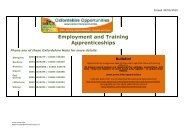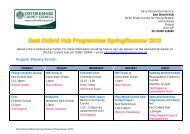Let's talk about⦠- Oxcentric
Let's talk about⦠- Oxcentric
Let's talk about⦠- Oxcentric
Create successful ePaper yourself
Turn your PDF publications into a flip-book with our unique Google optimized e-Paper software.
What next after university?<br />
The What Do Graduates Do?<br />
survey of those completing<br />
degrees in 2009, shows that<br />
67.2% entered employment;<br />
15.3% went on to further<br />
study or training and 8.9%<br />
were unemployed after six<br />
months.<br />
Of those completing<br />
Foundation Degrees, 58.5%<br />
entered employment; 32.8%<br />
went on to further study<br />
(many of those converting<br />
to a degree) and 2.7% were<br />
unemployed.<br />
• In the current economic climate, new<br />
graduates, like everyone else, are having a<br />
tough time finding employment. A survey<br />
of graduate employers showed they are<br />
expecting about a third of the vacancies<br />
they have on offer for 2011 will be filled<br />
by undergraduates who have had previous<br />
work experience with their organisations<br />
such as internships, industrial placements,<br />
vacation schemes or sponsorships.<br />
• On the whole more employers are actively<br />
seeking to employ graduates. In normal<br />
years, major companies take around 20%<br />
of each year’s leavers, with the rest being<br />
taken on by small and medium sized<br />
employers. However, there can be intense<br />
competition for some opportunities.<br />
• Although some employers recruit<br />
graduates with specific degree subjects<br />
these account for only about half of all<br />
graduate opportunities. The rest will<br />
consider graduates in any subject, who<br />
have the necessary qualities and skills to<br />
make a contribution to the organisation.<br />
However, having a degree is no guarantee<br />
of a good job – you need evidence of your<br />
employability too.<br />
• Research carried out by the Association<br />
of Graduate Recruiters identified the<br />
following as the skills valued by most<br />
employers:<br />
• initiative, motivation and enthusiasm<br />
• people skills such as team-working<br />
and communication<br />
• flexibility and willingness to learn<br />
• problem solving and analytical skills<br />
• computer literacy<br />
• business awareness.<br />
• While at university you will develop skills<br />
through your studies but you should<br />
also look beyond your course for other<br />
opportunities. These could include courses<br />
run by the university careers service, extra<br />
curricular activities which involve taking<br />
on new responsibilities, work experience<br />
and voluntary work.<br />
• Remember, your degree may be only a<br />
starting point in terms of learning. Many<br />
graduates will do further study and<br />
training after graduating.<br />
Top Tip!<br />
• Many graduate recruiters use<br />
assessment centres and competency<br />
based recruitment criteria.<br />
• Your key skills will be carefully<br />
assessed, irrespective of what is<br />
written on your CV or application<br />
form.<br />
• To remain employable you will need<br />
to be flexible and learn new skills<br />
throughout your working life.<br />
• For further information, including<br />
examples of jobs entered by<br />
graduates from most main subject<br />
areas, see What Do Graduates Do?<br />
(HECSU/AGCAS/UCAS). Also visit<br />
M www.prospects.ac.uk/links/<br />
wdgd<br />
• Make use of your university careers<br />
service – there will be a programme<br />
of courses and presentations geared<br />
towards helping you to develop<br />
your skills and make decisions about<br />
your future.<br />
• Research published by the Higher<br />
Education Statistics Agency showed<br />
that just three-and-a-half years after<br />
graduating, 81% of graduates were<br />
working in occupations classed as<br />
‘graduate occupations’ related to their<br />
long term career plans.<br />
• Some graduates choose to delay applying<br />
for graduate jobs until after they have<br />
completed their course, preferring to<br />
devote their energies to achieving the best<br />
results they can, before investigating their<br />
job options. Others take non-graduate jobs<br />
in order to fund travel plans.<br />
• Some employers, who have found it<br />
hard to attract applicants, offer financial<br />
incentives e.g. those planning to teach<br />
science, maths and modern languages<br />
can apply for training bursaries. These<br />
packages may even include paying off the<br />
student loan.<br />
for careers info go to M www.connexionsoxfordshire.com, then click on eCLIPS<br />
23






